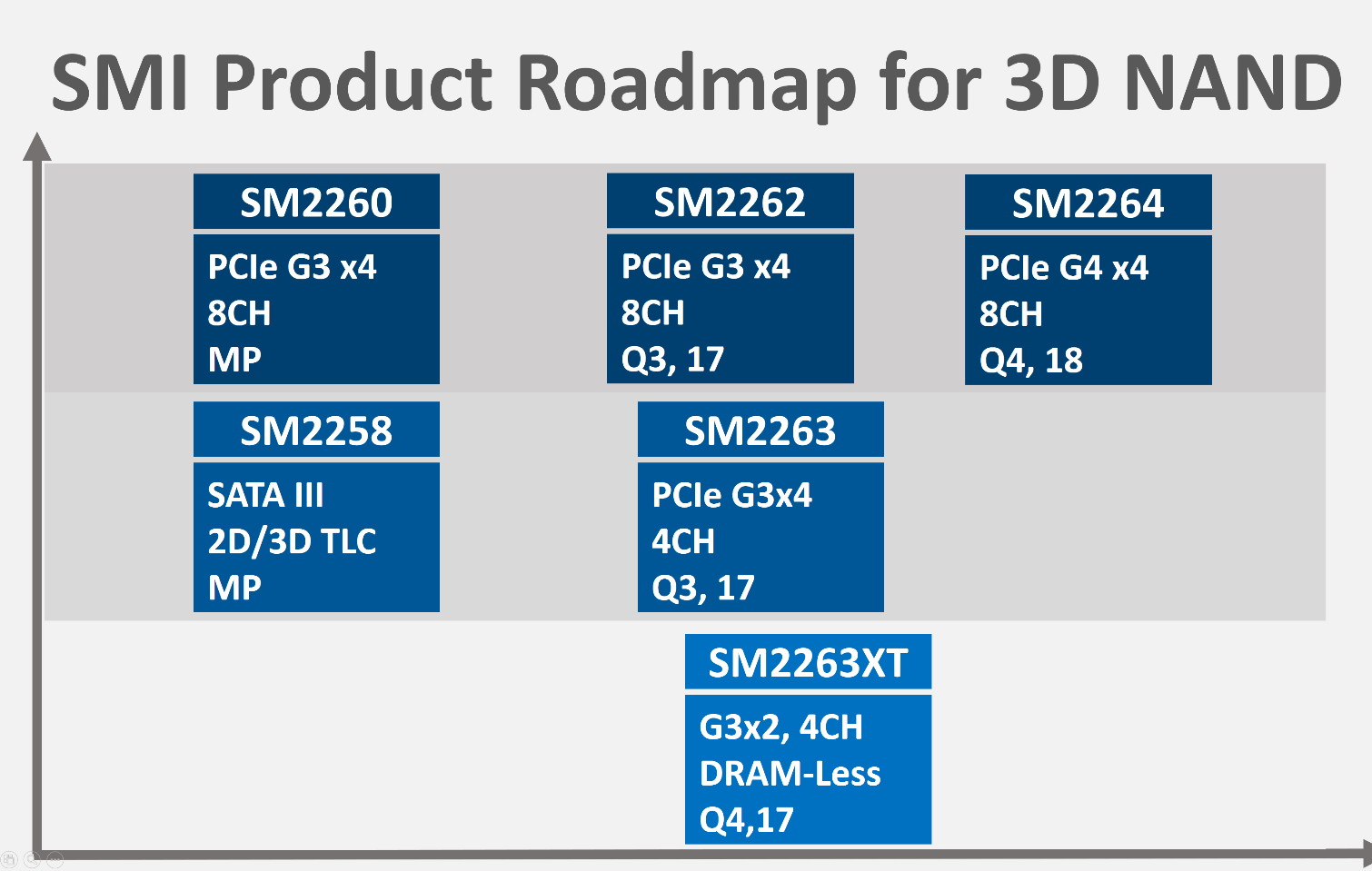Silicon Motion, Inc. Has PCIe 4.0 NVMe SSD On The Roadmap For 2018
Get Tom's Hardware's best news and in-depth reviews, straight to your inbox.
You are now subscribed
Your newsletter sign-up was successful
Silicon Motion, Inc. is the first storage company to talk about native PCIe 4.0 SSD controllers. At Computex we spotted a roadmap with the SM2264, the successor to the upcoming SM2262 set for a late 2017 release. The SM2264 is the first NVMe storage controller designed for PCIe 4.0. It should work well in both add-in card and M.2 form factors using a x4 configuration. It’s difficult to imagine the speeds we may see from such a device, but it should have a theoretical bandwidth of 64Gbps from it’s four lanes.
Silicon Motion, Inc. works closely with Intel and was chosen to power the latest SATA and NVMe M.2 NAND SSDs for the company on the consumer side. With that in mind, we’d call SMI a reliable source for the information on when Intel will want PCI Express 4.0 devices, barring any delays. Given the recent competition from AMD, we could see Intel reeling in the roadmap even closer. It does seem that Intel put a little pep in their step lately with aggressive core counts and pricing for upcoming products. AMD has already said it will target 2020 for PCIe 4.0.
At Computex 2017, Intel mentioned 8th Gen Core processors more than once. The company also gave us a vague reference to the performance by stating 8th Generation will feature a 30% performance improvement over existing products shipping today.The point is that Intel, the company famous for not commenting on future products, is commenting on future products.
This follows Intel’s announcement to put Thunderbolt 3 on the CPU die. Currently the Alpine Ridge Thunderbolt 3 bridge chip consumes four lanes of PCI Express 3.0 to deliver 32Gbps of data transfer throughput (40Gbps total only with video from a separate source). On consumer motherboards with only 16 PCIe lanes from the CPU, Thunderbolt 3 is a taxing add-on. Moving to PCIe 4.0 will effectively double the bandwidth. It should also double the bandwidth to the PCH to allow more high-speed devices to hang from the chip without limiting performance.
The improvements should come just in time for Optane Memory in DIMM form factor and first generation Optane SSDs to receive a price drop. The leap in performance coming in late 2018 should be incredible--quite possibly one of the largest PC ecosystem improvements in modern history.
Get Tom's Hardware's best news and in-depth reviews, straight to your inbox.

Chris Ramseyer was a senior contributing editor for Tom's Hardware. He tested and reviewed consumer storage.
-
epobirs I'd expect using just two PCIe 4.0 lanes will be a popular usage. This will offer the same performance as x4 on PCIe 3.0 while being more accomodating of systems with few lanes available. As NVMe SSDs move further into the mainstream, this will be an important cost saver.Reply -
josejones It's been 7 years since PCI 3.0 came out in 2010. It's wayyy late.Reply
https://1.f.ix.de/imgs/18/1/8/7/2/7/5/0/pcie5-ca055f534ed0435e.png
https://www.heise.de/newsticker/meldung/IDF-PCIe-4-0-laeuft-PCIe-5-0-in-Arbeit-3297114.html -
fynxer Seriously, 2020 for Pcie 4.0, this is ridiculous. AMD should jump at the chance to implement pcie 4.0 as soon as possible. If Intel does pcie 4.0 by end of 2018 it will look like AMD cannot keep up with Intel.Reply
Now when AMD is trying to make a comeback perception is everything, AMD has to do cutting edge to show the world they are back in the game and can keep up with Intel.
And even so with Pcie 4.0 so delayed it would seem even weirder to drag it out a few years extra.
Maybe it is time to introduce a completely new standard and put PCIE out to pasture, one that is far more flexible, much lower latency and can be scaled up in speed without delays.
